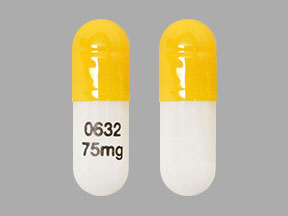Clomipramine and Alcohol/Food Interactions
There are 3 alcohol/food/lifestyle interactions with clomipramine.
Clomipramine Alcohol (Ethanol)
Moderate Drug Interaction
Ask your doctor before using clomiPRAMINE together with ethanol (alcohol), this can alter the effects of clomiPRAMINE and increase the side effects. Call the doctor if you experience uneven heartbeats, extreme drowsiness, confusion, agitation, vomiting, blurred vision, sweating, muscle stiffness, feeling light-headed, and seizures. You should be warned not to exceed recommended dosages, to avoid alcohol, and to avoid activities requiring mental alertness. If your doctor prescribes these medications together, you may need a dose adjustment to safely take this combination. It is important to tell your doctor about all other medications you use, including vitamins and herbs. Do not stop using any medications without first talking to your doctor.
Nicotine Clomipramine
Moderate Drug Interaction
Consumer information for this interaction is not currently available.
MONITOR: Smoking cessation may lead to elevated plasma concentrations and enhanced pharmacologic effects of drugs that are substrates of CYP450 1A2 (and possibly CYP450 1A1) and/or certain drugs with a narrow therapeutic index (e.g., flecainide, pentazocine). One proposed mechanism is related to the loss of CYP450 1A2 and 1A1 induction by polycyclic aromatic hydrocarbons in tobacco smoke; when smoking cessation agents are initiated and smoking stops, the metabolism of certain drugs may decrease leading to increased plasma concentrations. The mechanism by which smoking cessation affects narrow therapeutic index drugs that are not known substrates of CYP450 1A2 or 1A1 is unknown. The clinical significance of this interaction is unknown as clinical data are lacking.
MANAGEMENT: Until more information is available, caution is advisable if smoking cessation agents are used concomitantly with drugs that are substrates of CYP450 1A2 or 1A1 and/or those with a narrow therapeutic range. Patients receiving smoking cessation agents may require periodic dose adjustments and closer clinical and laboratory monitoring of medications that are substrates of CYP450 1A2 or 1A1.
Clomipramine Food/Lifestyle
Moderate Food Interaction
Grapefruit, grapefruit juice, and cranberry juice may cause the clomiPRAMINE levels in your body to increase. This may lead to potentially dangerous adverse effects. If you are receiving clomiPRAMINE therapy and consume cranberry juice or grapefruit products, you should be monitored for adverse effects and changes in clomiPRAMINE levels. Do not increase or decrease the amount of cranberry juice or grapefruit products in your diet without first talking to your doctor.
Switch to professional interaction data
Clomipramine drug interactions
There are 797 drug interactions with clomipramine.
Clomipramine disease interactions
There are 22 disease interactions with clomipramine which include:
- anticholinergic effects
- cardiovascular disease
- pheochromocytoma
- acute myocardial infarction recovery
- cardiovascular disease
- seizure disorders
- adrenal tumors
- hypomania/mania
- bone marrow suppression
- diabetes
- renal/liver disease
- schizophrenia/bipolar disorder
- tardive dyskinesia
- acute alcohol intoxication
- bipolar disorder screening
- glaucoma
- hyper/hypoglycemia
- liver/renal disease
- neutropenia
- schizophrenia
- thyroid disorders
- urinary retention
More about clomipramine
- clomipramine consumer information
- Check interactions
- Compare alternatives
- Pricing & coupons
- Reviews (317)
- Drug images
- Side effects
- Dosage information
- During pregnancy
- Support group
- Drug class: tricyclic antidepressants
- Breastfeeding
- En español
Related treatment guides
Drug Interaction Classification
| Highly clinically significant. Avoid combinations; the risk of the interaction outweighs the benefit. | |
| Moderately clinically significant. Usually avoid combinations; use it only under special circumstances. | |
| Minimally clinically significant. Minimize risk; assess risk and consider an alternative drug, take steps to circumvent the interaction risk and/or institute a monitoring plan. | |
| No interaction information available. |
See also:
Further information
Always consult your healthcare provider to ensure the information displayed on this page applies to your personal circumstances.


